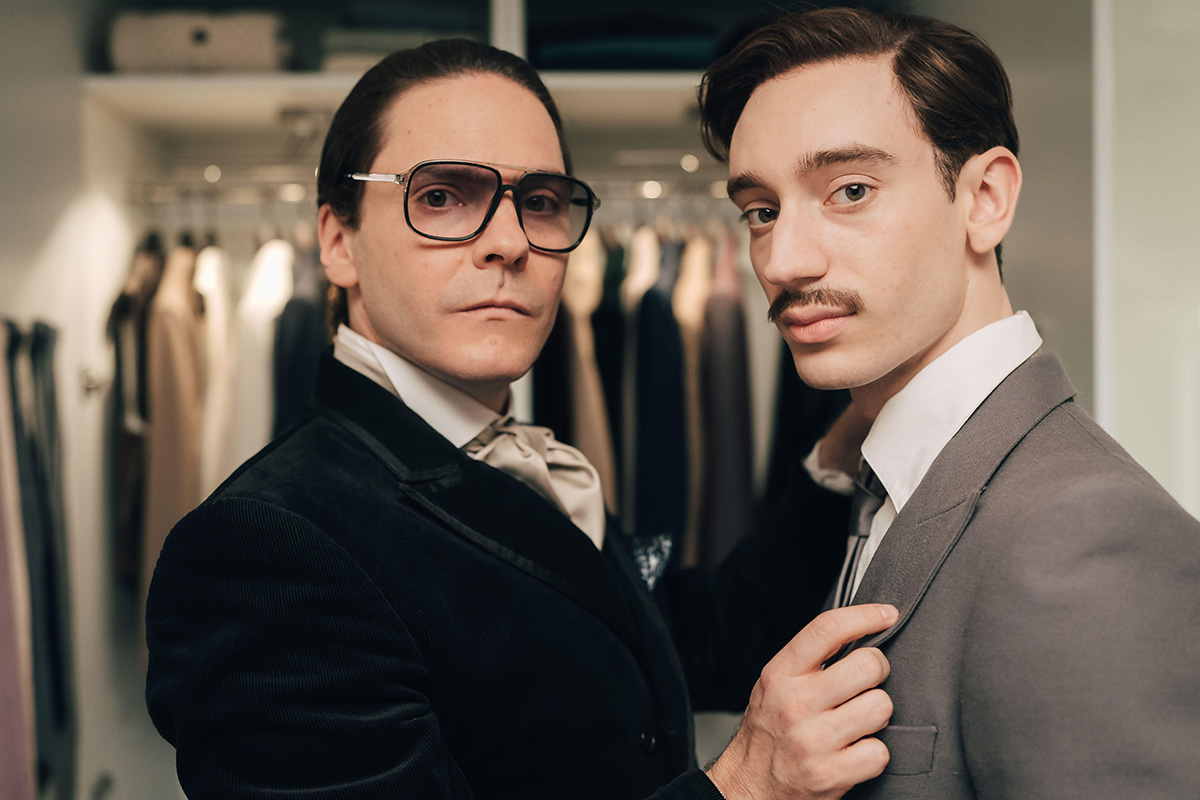Early on in Becoming Karl Lagerfeld, the Hulu series chronicling the rise of the German couturier from pret-a-porter mercenary to the Popehood of Parisian haute couture, there is a scene where his love interest asks, “Why does no one know you?” Lagerfeld (played to perfection by German actor Daniel Brühl ) responds that he likes his anonymity. “Yes, of course,” the young lover answers. “You dress like the Sun King but don’t want to be noticed.”
Throughout his life, Lagerfeld was more of a brand than the houses he represented. In an interview with The Observer Magazine in 2007, he said, “I am like a caricature of myself, and I like that. It is like a mask. And for me, the Carnival of Venice lasts all year long.”
Hulu’s six-part series goes behind that mask. It focuses on Karl before the powdered ponytail, the fan, the dark sunglasses, the fingerless gloves, and the aristocratic accent. Based on Raphaëlle Bacqué’s (co-creator of the film) brilliant Kaiser Karl, a biography published a year after Lagerfeld died in 2019 at 85, it tries to portray Lagerfeld as a sympathetic, almost human character.
To that end, the series creator, French writer Isaure Pisani-Ferry (known for Netflix’s Vampires and Ganglands), presents Lagerfeld’s repression and compulsion to succeed as character flaws rather than self-absorption and cruelty. Even though Lagerfeld once told an interviewer, “I have no human feelings,” Pisani-Ferry does his utmost to prove that he did.
But humanizing “Kaiser Karl” is no small feat. We’re talking about a racist, seizist, heartless self-appointed “genius,” who wore a corset, couldn’t stand anyone touching his fingers, and was quick with a nasty quip, like “I hate ugly people. They are very depressing.” Or even worse: “I know someone in Germany who took a young Syrian and after four days said, ‘The greatest thing Germany invented was the Holocaust.'”
The series revolves around the rivalry between Lagerfeld and his frenemy French fashion icon Yves St Laurent (both started their careers by winning a prestigious award in different categories). As such, it also follows St. Laurent’s then partner Pierre Berge and Lagerfeld’s great love, the French aristocratic dandy Jacques de Bascher, who was – for a time – also St. Laurent’s lover.
The cast includes the magnificent Brühl as an emotionally stunted Lagerfeld, French actor Araund Valois as a weirdly neurotic St. Laurent, and Canadian actor Theodore Pellerin as the perfectly debauched (but rather sweet) de Bascher.
Set in the champagne, drugs, and hedonism of the 1970s, with its soundtrack of Blondie’s Heart of Glass, Becoming Karl Lagerfeld illustrates the times and its changing fashion – from dressing ladies who lunch to the democracy of designs open to all. It is an indulgent, frivolous world where couturiers became rock stars and their hangers-on princes of the discothéque version of the Court of Versailles.
Along the way, we see big and small moments in Lagerfeld’s life – his destruction of de Bascher’s potential career, his obsessive need to be recognized, his emotionless stuffing his face with sweets when no one is looking, his relationship with his mother.
One of the most telling scenes is the strange and tragic seduction sequence between de Bascher and Lagerfeld. Karl refuses to be touched and never consummates their relationship physically. Yet, he stayed by de Bascher’s side when the young man was dying of complications of AIDS, sleeping in a cot in his hospital room.
Just one aside: I loved the fact that the series included Antonio Lopez, the iconoclast Puerto Rican fashion illustrator who was Lagerfeld’s friend and collaborator. Lopez was a Latinx influencer before the word existed and he still influences fashion today – just look at Fendi’s 2022 ready-to-wear line featuring Antonio’s designs.
Taking a microscope to fashion icons has been all the rave lately – think Halston, Dior, Valentino, Chanel, and Galliano. I have consumed almost all of these films and documentaries and written about those that impressed me. So trust me when I say that Becoming Karl Lagerfeld is the best of the lot.
It’s intelligent, beautifully shot, exquisitely acted (in mostly French dialogue), and makes the viewer a participant rather than an observer – we can feel Lagerfeld cinching his waist as he coldly adjusts the corset he wears underneath his meticulous costume. And costumes are what Lagerfeld and his legacy are all about.

